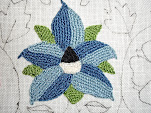Early Spring: An Ecologist and Her Children Wake to a Warming World. by Amy Seidl, is an excellent book on global warming and climate change. Rather than quoting lots of climatological data, she makes things real by looking at how timing has changed for seasonal events. The change of dates for bird migrations and maple syrup gathering. The insects that appear early and late, out of sync with their bird predators. The lack of solid ice on many norther lakes and snow at northerly latitudes affecting ice fishing contests and winter fairs. It may be hard for some people to grasp the rise in temperature and sea level expected in 100 years, but most people can recognize a change in the seasons from childhood to adulthood. With lovely, sensitive writing about her family, home, garden and the woods around her in Vermont, Amy Seidl quietly brings people around to the problems of global warming and why we need to be concerned.
Along with global warming, I am concerned with all the chemicals people apply to their lawns, especially since we live next to the reservoir that supplies our drinking water. So I eagerly read 'A Weed by Any Other Name; The Virtues of a Messy Lawn, or Learning to Love the Plants We Don't Plant' by Nancy Gift. Despite starting out in a weed science program where she studied weed control in crops (i.e. pesticide use), Nancy Gift is now the acting director of the Rachel Carson Institute at Chatham University in Pittsburgh, PA. Nancy Gift lives in the suburbs so she understands the desire, and sometimes the need, to conform to the standard weed-free perfect lawns. But she is also a mother who worries about the effects of pesticides on her children and she loves many weeds and feels a green lawn can include them, along with grass.
I was especially interested in this book since our front lawn has been taken over by moss and a wonderful weed that is a perfect ground cover - it stops growing at about 3 inches, takes the shade, grows on the clay, and looks fine (I suspect this is mainly because the yard slopes down from the road and the strip along the road has some grass). I'm sure if my children were playing on it, it wouldn't work, and the backyard is not so great, but for the front it seems fine, and my DH has only mowed once the whole summer. So I'm all in favour of weeds.
I also have a fondness for small mammals - I did my honours thesis research on voles - so I like to see animal holes in the ground around our yard. And I'm happy our yard it filled with toads.
Anyway, Gift's book covers various weeds seasonally as she discusses ways to live without pesticides. She gives lots of ideas for ground cover and how to justify a weedy lawn to the community association and especially how children can learn so much from playing in a yard with a variety of plants. If you want to escape from the tyranny of feeding, watering and pesticide application, this book will help.
The final book I've had a chance to read is 'Confessions of an Eco-Sinner: Tracking Down the Sources of My Stuff' by Fred Pearce. Pearce has travelled the world to find out what really happens when food is grown and raw materials are harvested, and how things are really disposed of. It is frustrating that the fair trade coffee I buy to try and help is not quite a good as I hoped, although it is much better than regular coffee. And while some cheap cotton t-shirts are made by companies slaves and children, other companies provide women independence from their husbands and money to educate their children, despite the sweat shop conditions. It is all terribly confusing, but it also made me realize that we all need to be more concerned about where the things we buy come from. And as long as Westerners want cheap goods, Third World people will be exploited. Pearce also tells some more inspiring stories about people who are doing good things. WonderWelders (www.wonderwelders.org ) uses money from selling refurbished phones to support a workshop of polio survivors making beautiful sculptures from scrap in Dar es Salaam. Projects to green cities, especially with edible plants, are growing. So Pearce leaves us hopeful - although we all have to work at it.
I have more reading ahead. Jane Goodall's 'Hope for Animals and Their World: How Endangered Species are Being Rescued from the Brink' and 'Half the Sky: Turning Oppression into Opportunity for Women Worldwide' by Nicholas D. Kristof and Sheryl WuDunn. Both look wonderful.



No comments:
Post a Comment